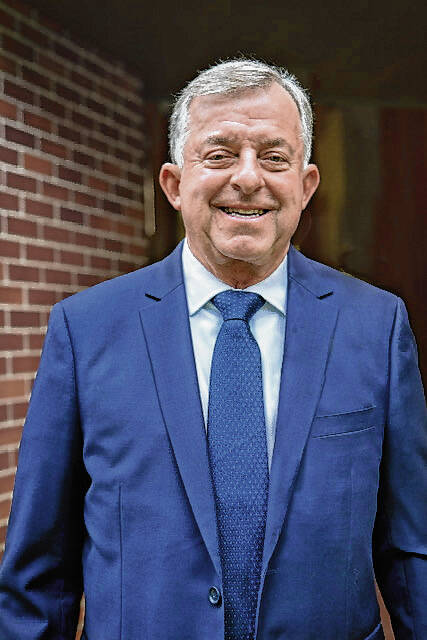The Bartholomew County commissioners voted 2-1 Monday to give preliminary approval to proposed regulations for sites for solar fields after a lengthy public hearing held in person and online.
Commissioners’ Chairman Carl Lienhoop cast the “no” vote, while Larry Kleinhenz and Tony London voted in favor of the ordinance. However, when the recommendations approved in August by the Bartholomew County Plan Commission come up for a second and final reading on Monday, Oct. 24, the commissioners said it’s likely they will ask for some changes.
The commissioners said they felt pressured into taking some action this week because state law only gives them 90 days from the day the plan commission makes its recommendation to take action themselves.
If the county commissioners make no decision by Nov. 14, the plan commission recommendations automatically become law, Columbus/Bartholomew County Planning Director Jeff Bergman said.
If the commissioners request changes during next week’s second reading, Bergman says the county’s executive board will have met its legal obligations. It will start another counting period that gives the plan commission 45 days to consider the county commissioners’ changes before sending it back with updated recommendations, Bergman said.
About 24 individuals told the commissioners their thoughts about solar fields in person Monday, while a much larger group observed the meeting online through Zoom video conferencing.
Nearly half of the individuals who spoke requested that setbacks for solar fields return to the original recommendation of 500 feet from residential lots of 5 acres or less. It was the plan commission who voted to reduce that distance to 200 feet in August after several farmers said if the setback is established at 500 feet, it will make it impossible to site any solar farm.
After listening to many explain why they don’t want or like solar fields, Lienhoop decided to made an admission.
“Personally, I’m not in favor of it either,” he said.
Lienhoop said he voted “no” because he thought the plan commission’s recommendations contained “confusing language.”
While he suggested that the 500-foot setback be restored, Lienhoop also suggested that negotiations be allowed to adjust the setback.
Lienhoop also expressed his agreement with audience member Skip Taylor, who said a 500-foot setback allows the county to “pump the brakes ” a bit on moving ahead with solar power. More time is needed to see what several neighboring counties are doing in securing sources of alternative energy before a specific setback is established, Taylor said.
Kleinhenz mentioned what he described as the unappealing aesthetics of a solar field.
“Personally, I would rather see no solar farms in the county because I love seeing crops and soybeans,” Kleinhenz said.
But all three said their their top concern is property rights of farmers. Kleinhenz said the key is to find a balance that allows a property owner to use their land as they wish, but not having a negative impact on their neighbors.
Kleinhenz is requesting changes in the ordinance at three different levels. He wants better assurances that the eventual decommissioning of a solar farm – or potential bankruptcy of a solar panel company – doesn’t have a negative impact on the property owner or taxpayers. He also wants to change a three-foot height requirement for the base of a solar panel. Finally, Kleinhenz also asked for more flexible setback regulations that can adjust with a farmer’s plan.
London praised the two years of work that Bergman and his staff have put into the proposed regulations, adding that he believes the recommendations should be accepted as presented.
London also agreed with comments made by retired Columbus attorney Mike Mullett, a board member of the “Energy Matters” community coalition. Mullett described the plan commission recommendations as reasonable, adding that they provide an opportunity for the community to welcome utility-scale solar power.
“I will tell you from my expertise that we are all going to want utility-scale solar in large amounts in the future if we want resiliency and reliability as far as the balance of power is concerned,” Mullett said.
But London also shared a concern expressed by Columbus real estate broker Jeff Hilycord. As he said last August before the plan commission, Hilycord cited university studies from other states that suggest a solar field can cause property values within a mile to decline. None of those studies originated in the Midwest, he said.





